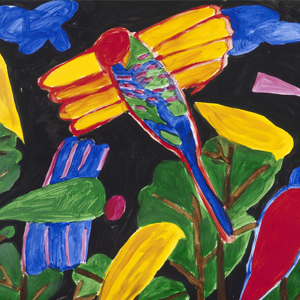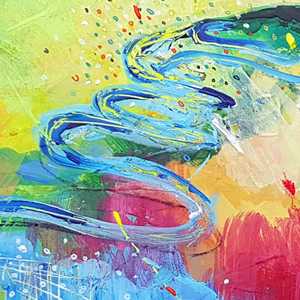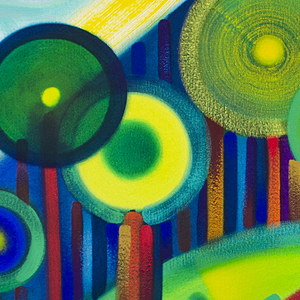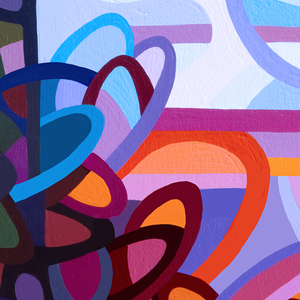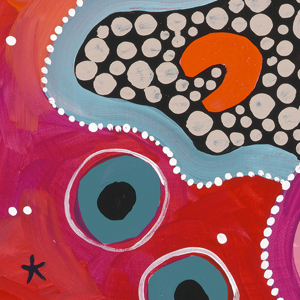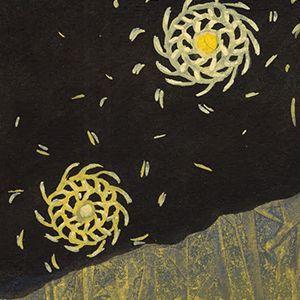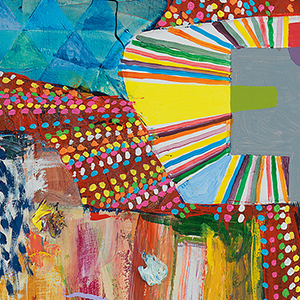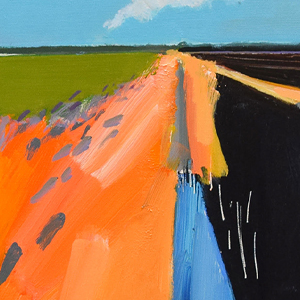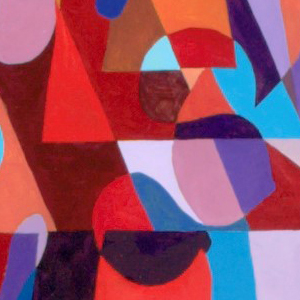
PURSUING VIRTUE
Redefining the Gift
Kelli Reagan Hickey
Artwork: “Fiume Liro” by Dan Bennett © 2017
It’s a distinct feeling, walking home from Yale University’s Sterling Memorial Library at night. Exiting the enormous wooden doors and stepping out into the dark is like breathing in the air of a million invitations, all at once. I’m there again, relishing in the hushed feeling of being unfinished and uncommitted, of having not yet decided. Somehow, it seems—in this place with these people—anything is possible.
The summer before college, my dad and I covered hundreds of miles on the dusty trails of the bosque, a charming patch of forest separating the Rio Grande River from the irrigation ditches that bring life to my hometown of Corrales, New Mexico. As a distance runner and new commit to Yale’s Cross Country and Track and Field teams, summer long runs were for dreaming.
Each Sunday as we set out—my dad on his trusty mountain bike, me in my trainers—we would start with business: recapping races, dissecting the latest depth charts and predictions, reliving our favorite lessons from past seasons and dreaming about the ones to come. Business complete, our conversation would settle on our favorite topics. We would talk about God, about life’s ultimate questions. My dad, an armchair philosopher and theologian, would share the fruits of his latest theological explorations—we would marvel at Pascal’s wager and probe the idea that power, wealth, and ambition distract us from the work and humility of living a meaningful life. We would talk about purpose, about goodness, about the people we loved and admired most.
As I stood nervously on the eve of a new life chapter, dad would remind me that my purpose at Yale was to “get an education.” It was to continue discerning what it means to be a good and loving person in the world—grades be damned! Somehow, thirteen odd miles later, life always seemed simpler, deeper, more beautiful.
Barreling into the driveway, we would finish each run with the adage of my high school hero, American distance running legend Steve Prefontaine: To give anything less than your best is to sacrifice the gift.
The moment I arrived in New Haven, my heart was anchored in a particular understanding of “the gift.” In the opening lines of his famous prayer “Fall in Love,” Joseph Whelan, SJ writes: “What you are in love with, what seizes your imagination, will affect everything. It will decide what will get you out of bed in the morning, what you do with your evenings, how you spend your weekends, what you read, whom you know, what breaks your heart, and what amazes you with joy and gratitude.”
At first, the gift was a series of moments: stretching out in flight each afternoon with my teammates, the miles ahead full of New England beauty, gossip, storytelling, bliss. Or crowding around a table in Morse dining hall, laughing and lingering just a while longer before beginning the cold, dark trudge toward an evening of study. Or entering St. Thomas More Catholic Chapel for late-night Sunday Mass, the pressures of exams and races melting away with God in our midst. The gift looked a lot like love—and meeting every encounter and opportunity with wonder and gratitude.
But somewhere between macroeconomics lectures with Nobel Laureates and my growing obsession with the Ivy League Track and Field record board, my understanding of the gift began to shift. Gradually, it began to look more and more like comparison, achievement, and striving.
Slowly, I lost touch with the ultimate questions I had fallen in love with over the miles with my dad. Instead, the unspoken values of the meritocracy—those characteristic of many elite research institutions—began to seep into my bones. Honoring the gift meant, above all, maintaining and improving upon a series of metrics: GPAs, mile splits, affirmation from coaches, professors, peers.
Rather than seeking to be a good friend, Christian, daughter, citizen, teammate—I turned devastatingly inward. My only commitment was to an ephemeral notion of “success,” to the “next best thing.” Ross Douthat, New York Times opinion columnist, expressed a relevant idea in a recent podcast: “I don’t think Harvard was good for my soul.”
In his 2020 book Let Us Dream, Pope Francis writes about crises as moments of sifting: “To enter into crisis is to be sifted. Your categories and ways of thinking get shaken up; your priorities and lifestyles are challenged. You cross a threshold, either by your own choice or by necessity, because there are crises . . . that you can’t avoid” (Prologue).
Crisis came—unwelcome, as all crises are—the fall of my junior year. On a brisk October morning over a routine bowl of oatmeal, I learned that a dear friend and teammate had ended his life.
There are no words to describe the weighted sadness of a team funeral service, or the silence of a neighboring desk that days before was filled with life and wit. When I think about Hale, I still find myself wrestling with God—there’s so much that I don’t know, so much that I don’t understand. What I do know is that the world was immensely brighter and better with him in it. Hale was as fierce a friend as he was a competitor. He had a gentle spirit, a stinging sense of humor, and a contagious warmth. Hale was intrinsically, sincerely, and profoundly good.
I don’t know how fast Hale could race a 5k, what place he finished at the Ivy League Championships, what internships he landed, nor the heights of his GPA. What I do remember are the long nights we spent finishing microeconomics problem sets over an enormous bag of trail mix. Or that time we celebrated our sophomore fall over Ashley’s Ice Cream, trading hilarious stories of Christmas-traditions-gone-wrong. And that evening at our team formal, falling to the floor in a heap of giggles after hours of badly-attempted swing dancing. The exchanged smiles, the start-line wishes, the mid-lecture nudges, the team dinner banter—Hale brought so much joy to the simple act of living. He was truly a light.
On the floor of my dorm room, sitting in the quiet of Hale’s absence, I realized that I had no idea what I was building, no conception what mattered or what I was working toward. My purpose and philosophy of life—the marks of “success” I had been carefully crafting and storing away—felt frivolous. For the first time, “the gift” was empty.
There’s a beautiful word at the heart of the Christian tradition: metanoia. Translated from the Greek, metanoia means “to change one’s mind” or “think beyond all known.” Metanoia moments, often, are painful—a favorite image for metanoia comes from Genesis 32:24: Jacob wrestles with God and God breaks his leg. Metanoia breaks us. Somehow, in our very bones, we are different than before. But, perhaps through grace, our brokenness and suffering usher us into a more beautiful way of being human in the world.
Metanoia, for me, began in the grief and tragedy of Hale’s death. And it unfolded—painfully, beautifully, unknowingly—with the invitation of two brilliant professors.
Wandering into a new semester ensconced in a cloud of confusion and purposelessness, I stumbled across a course that changed everything. David Brooks, columnist for the New York Times, was offering a seminar on “Successful Global Leadership.”
The course had nothing to do with successful global leadership. Its nickname, “Therapy with Brooks,” painted a more accurate picture. At the outset, Brooks called into question the notion of success en vogue at places like Yale. Similar to his popular column “The Moral Bucket List,” he made clear that the work of the course was to center our attention on eulogy virtues, not resume virtues. Résumé virtues, he writes, “are the skills you bring to the marketplace. The eulogy virtues are the ones that are talked about at your funeral—whether you were kind, brave, honest or faithful. Were you capable of deep love?”
Brooks proposed a countercultural idea. He suggested that our purpose—“the gift”—is not found in the relentless pursuit of wealth and prestige, but in the way we live out structured and well-discerned commitments: to a place, a vocation, a calling, a philosophy of life. For the first time at Yale, I was back with my dad on the winding trails of the bosque—thinking about ends.
In the meager time I had to devote to my “core” economics coursework, I found myself ditching marginal rates of return and spending hours with Victor Frankl, Mother Teresa, Sheldon Vaunaken, and Dorothy Day. This kind of soul work—studying the wisdom, the trials, the warmth, and the humanity of who would become my moral heroes—colored my faith and intellect in ways I never expected.
After tracing trends in loneliness, deaths of despair, polarization, and declining community, Brooks claimed that what our world needed most was a moral revolution: a movement to orient our lives, work, and conversations toward the good, the true, and the beautiful, toward ultimate questions of meaning and purpose. One charge from the course was particularly striking. “In your twenties,” he told us, “your job is to figure out your philosophy of life.” With my sense of purpose and self shattered by Hale’s death, I knew that I had found the questions—I had found the work—I would commit my life to.
But the charge to figure out a “philosophy of life” was a meaty one. It went unanswered until, in graduate school, I had a chance encounter with Catholic Social Teaching (CST). CST is an ethic of life inspired by the Gospel—it’s “a practical ethic that seeks to move the world as it is closer to the kind of world God means it to be.”1 With great care, theologian and Christian ethicist Clemens Sedmak unpacked CST and its emphasis on dignity, solidarity, work, participation, and care for the earth and the poor. Reading Pope Francis’ Laudato Si’ and witnessing the heroic courage and legacies of those committed to CST, I knew I had found the answer to Brooks’ challenge. I had found my purpose, my philosophy of life. I had found the gift.
For Sedmak, CST is not a set of harmless ethical principles. It’s a theology, a means of discipleship—a way of following Christ in the world. CST privileges smallness, gentleness, dailiness, depth. It’s as much about what we do with our lives as how we go about them. It stands in stark contrast to the meritocracy, to the world’s definition of success.
Living CST is not about climbing upwards. It’s about what Dean Brackley, SJ calls “downward mobility”—that “those who wish to be Jesus’ companions in mission will have to resist temptations to wealth, prestige, and ambition and beg to follow him in poverty, service, and persecution.” It’s about, to borrow the words of Dietrich Bonhoeffer, “really starting work on the Sermon on the Mount.”
CST transformed my understanding of the gift. The gift is my mom’s tenderness as she cares for my Grandpa in the final years of his life. It’s the way Sophie Scholl and Franz and Fani Jaegerstaetter stood up to the Nazi regime and lost their lives. It’s the way the whole town showed up for my Grandma’s funeral, the way so many go unnoticed and dedicate themselves to the tedious, lowly tasks that come with stewarding communities and sustaining meaningful, worthwhile commitments.
Now, reflecting on my graduate and undergraduate educations and squarely in the first chapter of my education in the “real world,” I’ve come to believe that the meaning and purpose of education, like that of a crisis, is to sift. Our education should shake up our categories, challenge our priorities, and call into question our dominant visions of success. It should plunge us into debates about purpose, meaning, faith, and the good. It should center life’s most important questions: who we are, where we are going, what we owe each other, who we ought to be. At its best, education is about formation. It’s about learning to live a life in the fullness of our human dignity—and building the kind of world that allows others to do the same.
Sometimes, in the early morning miles of another dark, mundane Ohio run, nostalgia will creep in. I’ll find myself walking home from Sterling Memorial Library late at night, crossing Yale’s murmuring, storied campus. I’m overcome, again, with the magical, capacious feeling of becoming, the freedom that comes from being entirely unattached and uncommitted.
I’ll let myself linger there, just for a moment.
Then, thinking of Hale and returning to the warmth of my sweet husband, I’ll remember. And I’ll recommit to the gift.
Note
Kelli Reagan Hickey is the Director of Formation for the Francesco Collaborative, a team that partners with faith-based investors to reimagine an investment practice anchored in Catholic Social Teaching. Kelli is co-author of the book Counting the Cost: Financial Decision-Making, Discipleship, and Christian Living and serves on the board of directors for the National Institute for Ministry with Young Adults and the Bethany Land Institute.
Spring 2024
Part I: Pursuing Virtue
L. Gregory Jones
Sabrina B. Little
Kelli Reagan Hickey
Jesse S. Summers
Interlude: Purposeful Pursuits
Howard Gardner
Part II: Pursuing Vocation
Clayton Spencer
James Coleman, Jr.
James and Margaret Plews-Ogan
Carolyn Woo
MORE





